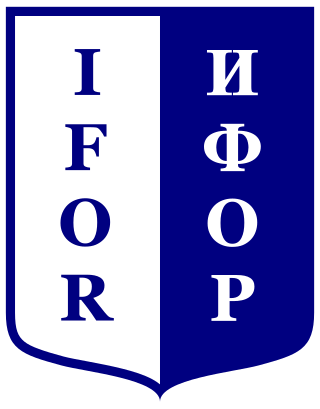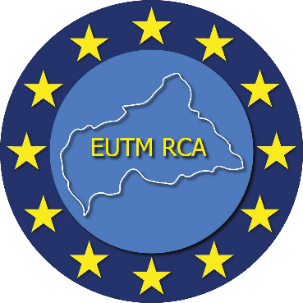Related Research Articles

The Armed Forces of Bosnia and Herzegovina is the official military force of Bosnia and Herzegovina. The BiH armed forces were officially unified in 2005 and are composed of two founding armies: the Bosniak Army of the Federation of Bosnia and Herzegovina (VFBiH) and the Bosnian Serbs' Army of Republika Srpska (VRS).

The Finnish Defence Forces (FDF) (Finnish: Puolustusvoimat, Swedish: Försvarsmakten) are the military of Finland. The Finnish Defence Forces consist of the Finnish Army, the Finnish Navy, and the Finnish Air Force. In wartime, the Finnish Border Guard becomes part of the Finnish Defence Forces.

The Army of the Republic of North Macedonia is the military of North Macedonia. The army is organized, prepared and trained to conduct armed struggle and combat and other actions to achieve its constitutional function of defending the independence and territorial integrity of North Macedonia. The army consists of the ground forces and the air force, which are further divided into branches and services. The army has a permanent composition and reserve forces. Since 2005, it is a fully professional defense force compatible with NATO standards. On 27 March 2020, North Macedonia joined NATO as the 30th member.

The Armed Forces of the Slovak Republic were divided from the Czechoslovak Army after dissolution of Czechoslovakia on 1 January 1993. Slovakia joined NATO on 29 March 2004. From 2006 the army transformed into a fully professional organization and compulsory military service was abolished. Slovak armed forces numbered 19,500 uniformed personnel and 4,208 civilians in 2022.

The Irish Army, also known within Ireland simply as the Army, is the land component of the Defence Forces of Ireland. The Irish Army has an active establishment of 7,520, and a reserve establishment of 3,869. Like other components of the Defence Forces, the Irish Army has struggled to maintain strength and as of April 2023 has only 6,322 active personnel, and 1,382 reserve personnel. The Irish Army is organised into two brigades.

The Implementation Force (IFOR) was a NATO-led multinational peace enforcement force in Bosnia and Herzegovina under a one-year mandate from 20 December 1995 to 20 December 1996 under the codename Operation Joint Endeavour.

The Stabilisation Force (SFOR) was a NATO-led multinational peacekeeping force deployed to Bosnia and Herzegovina after the Bosnian War. Although SFOR was led by NATO, several non-NATO countries contributed troops. It was replaced by EUFOR Althea in December 2004.

The Common Security and Defence Policy (CSDP) is the European Union's (EU) course of action in the fields of defence and crisis management, and a main component of the EU's Common Foreign and Security Policy (CFSP).

Operation Althea, formally the European Union Force Bosnia and Herzegovina (EUFOR), is a military deployment in Bosnia and Herzegovina to oversee the military implementation of the Dayton Agreement. It is the successor to NATO's SFOR and IFOR. The transition from SFOR to EUFOR was largely a change of name and commanders: 80% of the troops remained in place. It replaced SFOR on 2 December 2004.

The Military Staff of the European Union (EUMS) is the directorate-general of the European Union's (EU) External Action Service (EEAS) that contributes to the EU's Common Security and Defence Policy (CSDP) by providing strategic advice to the High Representative (HR/VP) and commanding operations through its Military Planning and Conduct Capability (MPCC) operational headquarters. From the end of 2020, the MPCC will be capable of running executive operations of up to 2,500 troops, i.e. the size of one EU battle group, as well as 3 non-executive missions.

The Chilean Army is the land arm of the Chilean Armed Forces. This 80,000-person army is organized into six divisions, a special operations brigade and an air brigade.

The Berlin Plus agreement is the short title of a comprehensive package of agreements made between NATO and the EU on 16 December 2002. These agreements were based on conclusions of NATO's 1999 Washington summit, sometimes referred to as the CJTF mechanism, and allowed the EU to draw on some of NATO's military assets in its own peacekeeping operations.

European Union Force Chad and the Central African Republic, also EUFOR Tchad/RCA after the French, was the European Union mission in Chad and the Central African Republic (CAR), authorised in late 2007. EUFOR Chad/CAR was authorised under the same United Nations Security Council resolution that mandated MINURCAT, a UN force tasked with training police and improving judicial infrastructure.

The Common Security and Defence Policy Service Medal is an international military decoration awarded to individuals, both military and civilian, who have served with CSDP missions. Since the 1990s the European Union has taken a greater role in military missions both in Europe and abroad. These actions were taken under the Common Security and Defence Policy (CSDP), which is implemented by the European Union Military Staff, a department of the EU. To recognize service in these missions the EU authorized the creation of a medal with a common obverse and reverse, to which clasps featuring the missions' name are attached to the ribbon bar.
United Nations Security Council Resolution 2019 was unanimously adopted on 16 November 2011, and approved the mandate of European force in Bosnia and Herzegovina.

European Union Force RCA, commonly referred as EUFOR RCA, is the United Nations-mandated European Union peacekeeping mission in Bangui, capital of the Central African Republic. The goal of the mission is to stabilize the area after more than a year of internal conflict. Agreement about the mission was reached in January 2014, and the first operations started at the end of April. The mission ended its mandate after nearly a year on 15 March 2015.

This article outlines the defence forces of the European Union (EU), which implement the EU's Common Security and Defence Policy (CSDP) in CSDP missions. There are two categories of EU multinational forces: ones that have been established intergovernmentally and made available to the CSDP through article 42.3 of the Treaty on European Union (TEU), such as the Eurocorps; and the EU Battlegroups, established at the EU level.

The European Union Training Mission in the Central African Republic (EUTM-RCA) is a European Union multinational training mission headquartered in Bangui, Central African Republic.

Lieutenant General Seán Clancy is an Irish Air Corps general and current Chief of Staff of the Irish Defence Forces since 29 September 2021.